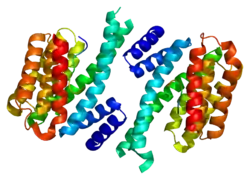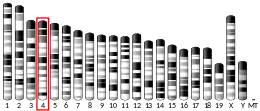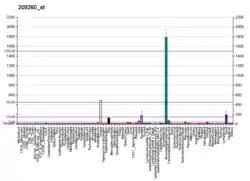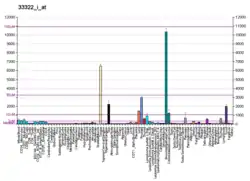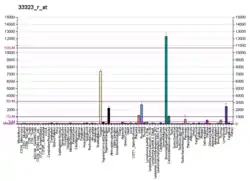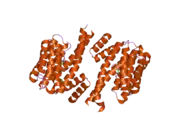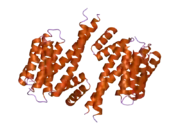Stratifin
Stratifin (also known as 14-3-3 protein sigma or 14-3-3σ protein) is a protein encoded by the SFN gene in humans.[5][6] The protein is named for its presence in stratified epithelial cells.[5]
Interactions
Stratifin has been shown to interact with PLK4,[7] ERRFI1,[8] MARK3,[7][8] JUB[8] and YWHAG.[8]
References
- GRCh38: Ensembl release 89: ENSG00000175793 - Ensembl, May 2017
- GRCm38: Ensembl release 89: ENSMUSG00000047281 - Ensembl, May 2017
- "Human PubMed Reference:". National Center for Biotechnology Information, U.S. National Library of Medicine.
- "Mouse PubMed Reference:". National Center for Biotechnology Information, U.S. National Library of Medicine.
- Leffers H, Madsen P, Rasmussen HH, Honoré B, Andersen AH, Walbum E, Vandekerckhove J, Celis JE (June 1993). "Molecular cloning and expression of the transformation sensitive epithelial marker stratifin. A member of a protein family that has been involved in the protein kinase C signalling pathway". Journal of Molecular Biology. 231 (4): 982–98. doi:10.1006/jmbi.1993.1346. PMID 8515476.
- "Entrez Gene: SFN stratifin".
- Rual JF, Venkatesan K, Hao T, Hirozane-Kishikawa T, Dricot A, Li N, et al. (October 2005). "Towards a proteome-scale map of the human protein-protein interaction network". Nature. 437 (7062): 1173–8. Bibcode:2005Natur.437.1173R. doi:10.1038/nature04209. PMID 16189514. S2CID 4427026.
- Benzinger A, Muster N, Koch HB, Yates JR, Hermeking H (June 2005). "Targeted proteomic analysis of 14-3-3 sigma, a p53 effector commonly silenced in cancer". Molecular & Cellular Proteomics. 4 (6): 785–95. doi:10.1074/mcp.M500021-MCP200. PMID 15778465.
Further reading
- Hermeking H (January 2005). "Extracellular 14-3-3sigma protein: a potential mediator of epithelial-mesenchymal interactions". The Journal of Investigative Dermatology. 124 (1): ix–x. doi:10.1111/j.0022-202X.2004.23534.x. PMID 15654940.
- Mhawech P (April 2005). "14-3-3 proteins--an update". Cell Research. 15 (4): 228–36. doi:10.1038/sj.cr.7290291. PMID 15857577.
- Lodygin D, Hermeking H (April 2005). "The role of epigenetic inactivation of 14-3-3sigma in human cancer". Cell Research. 15 (4): 237–46. doi:10.1038/sj.cr.7290292. PMID 15857578.
- Rasmussen HH, van Damme J, Puype M, Gesser B, Celis JE, Vandekerckhove J (December 1992). "Microsequences of 145 proteins recorded in the two-dimensional gel protein database of normal human epidermal keratinocytes". Electrophoresis. 13 (12): 960–9. doi:10.1002/elps.11501301199. PMID 1286667. S2CID 41855774.
- Prasad GL, Valverius EM, McDuffie E, Cooper HL (August 1992). "Complementary DNA cloning of a novel epithelial cell marker protein, HME1, that may be down-regulated in neoplastic mammary cells". Cell Growth & Differentiation. 3 (8): 507–13. PMID 1390337.
- Hermeking H, Lengauer C, Polyak K, He TC, Zhang L, Thiagalingam S, Kinzler KW, Vogelstein B (December 1997). "14-3-3sigma is a p53-regulated inhibitor of G2/M progression". Molecular Cell. 1 (1): 3–11. doi:10.1016/S1097-2765(00)80002-7. PMID 9659898.
- Chan TA, Hermeking H, Lengauer C, Kinzler KW, Vogelstein B (October 1999). "14-3-3Sigma is required to prevent mitotic catastrophe after DNA damage". Nature. 401 (6753): 616–20. Bibcode:1999Natur.401..616C. doi:10.1038/44188. PMID 10524633. S2CID 4413753.
- Laronga C, Yang HY, Neal C, Lee MH (July 2000). "Association of the cyclin-dependent kinases and 14-3-3 sigma negatively regulates cell cycle progression". The Journal of Biological Chemistry. 275 (30): 23106–12. doi:10.1074/jbc.M905616199. PMID 10767298.
- Samuel T, Weber HO, Rauch P, Verdoodt B, Eppel JT, McShea A, Hermeking H, Funk JO (November 2001). "The G2/M regulator 14-3-3sigma prevents apoptosis through sequestration of Bax". The Journal of Biological Chemistry. 276 (48): 45201–6. doi:10.1074/jbc.M106427200. PMID 11574543.
- Johnson BA, Stehn JR, Yaffe MB, Blackwell TK (May 2002). "Cytoplasmic localization of tristetraprolin involves 14-3-3-dependent and -independent mechanisms". The Journal of Biological Chemistry. 277 (20): 18029–36. doi:10.1074/jbc.M110465200. PMID 11886850.
- Tian H, Faje AT, Lee SL, Jorgensen TJ (2002). "Radiation-induced phosphorylation of Chk1 at S345 is associated with p53-dependent cell cycle arrest pathways". Neoplasia. 4 (2): 171–80. doi:10.1038/sj.neo.7900219. PMC 1550321. PMID 11896572.
- Ku NO, Michie S, Resurreccion EZ, Broome RL, Omary MB (April 2002). "Keratin binding to 14-3-3 proteins modulates keratin filaments and hepatocyte mitotic progression". Proceedings of the National Academy of Sciences of the United States of America. 99 (7): 4373–8. Bibcode:2002PNAS...99.4373K. doi:10.1073/pnas.072624299. PMC 123655. PMID 11917136.
- Urano T, Saito T, Tsukui T, Fujita M, Hosoi T, Muramatsu M, Ouchi Y, Inoue S (June 2002). "Efp targets 14-3-3 sigma for proteolysis and promotes breast tumour growth". Nature. 417 (6891): 871–5. Bibcode:2002Natur.417..871U. doi:10.1038/nature00826. PMID 12075357. S2CID 4348545.
- Liu MY, Cai S, Espejo A, Bedford MT, Walker CL (November 2002). "14-3-3 interacts with the tumor suppressor tuberin at Akt phosphorylation site(s)". Cancer Research. 62 (22): 6475–80. PMID 12438239.
- Bhatia K, Siraj AK, Hussain A, Bu R, Gutiérrez MI (February 2003). "The tumor suppressor gene 14-3-3 sigma is commonly methylated in normal and malignant lymphoid cells". Cancer Epidemiology, Biomarkers & Prevention. 12 (2): 165–9. PMID 12582028.
- Kino T, Souvatzoglou E, De Martino MU, Tsopanomihalu M, Wan Y, Chrousos GP (July 2003). "Protein 14-3-3sigma interacts with and favors cytoplasmic subcellular localization of the glucocorticoid receptor, acting as a negative regulator of the glucocorticoid signaling pathway". The Journal of Biological Chemistry. 278 (28): 25651–6. doi:10.1074/jbc.M302818200. PMID 12730237.
- Nakajima T, Shimooka H, Weixa P, Segawa A, Motegi A, Jian Z, Masuda N, Ide M, Sano T, Oyama T, Tsukagoshi H, Hamanaka K, Maeda M (June 2003). "Immunohistochemical demonstration of 14-3-3 sigma protein in normal human tissues and lung cancers, and the preponderance of its strong expression in epithelial cells of squamous cell lineage". Pathology International. 53 (6): 353–60. doi:10.1046/j.1440-1827.2003.01481.x. PMID 12787309. S2CID 24822056.
- Rishi AK, Zhang L, Boyanapalli M, Wali A, Mohammad RM, Yu Y, Fontana JA, Hatfield JS, Dawson MI, Majumdar AP, Reichert U (August 2003). "Identification and characterization of a cell cycle and apoptosis regulatory protein-1 as a novel mediator of apoptosis signaling by retinoid CD437". The Journal of Biological Chemistry. 278 (35): 33422–35. doi:10.1074/jbc.M303173200. PMID 12816952.
This article is issued from Wikipedia. The text is licensed under Creative Commons - Attribution - Sharealike. Additional terms may apply for the media files.
